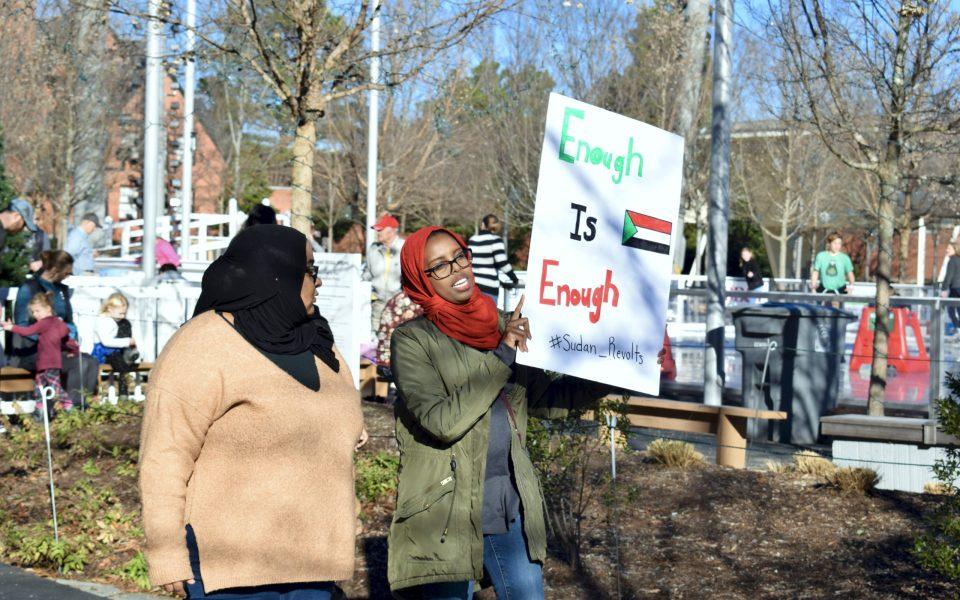Gusts of wind carried Sudanese music through Greensboro’s LeBauer Park on Saturday afternoon, where nearly 70 people coalesced to stand in solidarity with Sudanese demonstrators calling for the resignation of President Omar al-Bashir — an authoritarian who rose to power through a military coup d’état in 1989 —following his announcement that the government would end bread subsidies.
Since Dec. 19, tens of thousands of people have taken to the streets in Atbara, Port Sudan and Khartoum, the northeast African country’s capital, where a protest is planned for Sunday. According to Associated Press reports, police have used tear gas and live rounds to disperse demonstrators, including those who peacefully gathered in meeting places like mosques. Amnesty International has reported at least 37 killings by security forces over the last two weeks.
“We’re not going to stand for innocent people being murdered just for wanting to be able to feed their children or to travel outside their country,” said Doha Medani, a local Sudanese-American woman. Medani is a co-founder of Muslim Women For —the only Muslim women-led social justice organization in North Carolina —which organized yesterday’s demonstration along with Sudanese Youth Organization and the Sudanese Cultural Dar of Greensboro. During the gathering, local Sudanese-Americans emphasized the regime’s corruption and harmful policy choices like funneling billions of dollars into defense contracts instead of adequately funding education, healthcare and infrastructure. Al-Bashir’s reign has seen civil war, ethnic conflict and a collapsing economy.

“People don’t realize the Sudanese community here is ridiculously huge,” Medani said.
According to her, Greensboro hosts one of the largest Sudanese populations in the U.S. behind Dallas, Texas and the Washington D.C. area.
“We all know each other but the issue is the disconnect between… those personal relationships and translating them into political noise and action,” Medani said. “So yes, this is a protest, but then we can take the connections we make here and translate that into talking to our representatives so if anything happens in Sudan, God forbid, our congressmen and women know there’s a big Sudanese population and we’re going to vote.”
The Greensboro protest followed similar demonstrations in Paris, London, Washington DC, Texas and Charlotte following escalating violence against unarmed protestors.

“Essentially they have a dictator who’s been in power for decades,” Medani said. “Sudan has been independent for about 60 years and they’ve had this current president for almost 30 years, so for half the time they’ve been independent they’ve had this one president. The funny thing is they do elections every four years, but last time he won with 98 percent of the vote; it’s a mockery of democracy.”
The current protests, which began spontaneously, are the largest in Sudan’s recent history, but calls for al-Bashir’s resignation aren’t new; in 2013, government forces killed about 200 people during similar demonstrations in the capital.
Organizer Sara Jado read a poem dedicated to Sudanese freedom fighters killed during the decades-long struggle for dignity and democracy before leading the group on a march around the park and parts of downtown. Marchers chanted: “Not another 30 years, we’ve cried enough tears!” and “Al-Bashir to ICC!,” referring to the International Criminal Court which indicted al-Bashir in 2010 for genocide and crimes against humanity committed in Darfur.

Join the First Amendment Society, a membership that goes directly to funding TCB‘s newsroom.
We believe that reporting can save the world.
The TCB First Amendment Society recognizes the vital role of a free, unfettered press with a bundling of local experiences designed to build community, and unique engagements with our newsroom that will help you understand, and shape, local journalism’s critical role in uplifting the people in our cities.
All revenue goes directly into the newsroom as reporters’ salaries and freelance commissions.


Leave a Reply